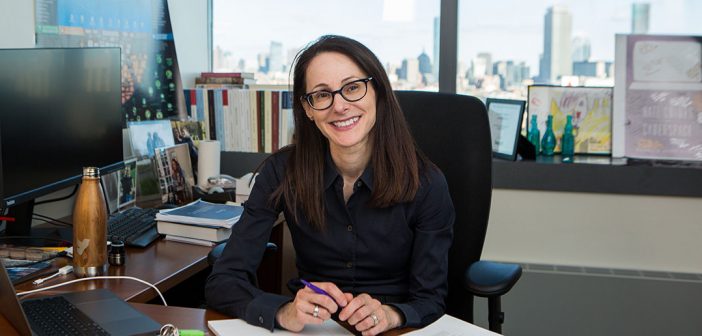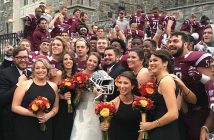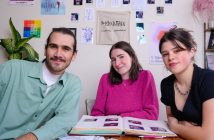A Boston University law professor and former adjunct associate professor of legal research and writing at Fordham Law School, Citron is one of 26 artists, scientists, and others to earn the award this year.
Commonly known as the “genius” grant, the fellowship recognizes recipients’ “originality, insight, and potential,” and comes with a $625,000 no-strings-attached award to be paid over five years.
In selecting Citron as a 2019 fellow, the MacArthur Foundation praised her for “addressing the scourge of cyber harassment by raising awareness of the toll it takes on victims and proposing reforms to combat the most extreme forms of online abuse.”
Her work, the foundation added, is “spurring legal scholars, lawmakers, tech companies, and the public to view in a new light what many have simply accepted as the inevitable dark side of the digital age.”
Framing Cyber Harassment as a Violation of Civil Rights
In her 2014 book, Hate Crimes in Cyberspace (Harvard University Press), Citron wrote about victims of various forms of cyber harassment, including “revenge porn”—the dissemination of sexually explicit photos or videos of people without their permission. She described how the victims, who are disproportionately women, can have their lives and livelihoods nearly ruined by the experience. And yet, she found, law enforcement did not take these kinds of attacks seriously—or did not fully understand how existing laws could be used to prosecute harassers.
“When I first started writing about the targeting of women and sexual minorities and minorities online in about 2007, the response was just, you know, ‘this is part of online life,’ ‘this is the nature of the internet,’ or ‘this is the nature of humanity in a digital age.’ And the answer is, absolutely not,” Citron says in a video produced by the MacArthur Foundation. “This is not something that we should accept.”
She has called for both legal and social reforms. With federal and state lawmakers and state attorneys general, she has stressed the need to enhance criminal, tort, and civil rights laws, and to use existing statutes to deter and punish online harassers. She also works with companies (she’s an unpaid adviser to Facebook and Twitter) on strengthening online safety and privacy policies and “ensuring that this kind of abuse isn’t tolerated,” she says.
Sounding the Alarm on Deepfakes and the Threat to Democracy
In fall 2018, Citron returned to Fordham Law School as a visiting professor, teaching a course on information privacy law and a seminar titled Civil Rights and Civil Liberties in the Digital Age. She was back again on September 23, just two days before the MacArthur grant announcement, to share her latest research with students and faculty.
In recent months, Citron has been writing and speaking about the legal, ethical, social, and political ramifications of deepfake technology, which allows users to manipulate or fabricate video and audio recordings to show people doing and saying things they’ve never done or said.
Last June, she testified before the House Permanent Select Committee on Intelligence, warning legislators that the “technology behind the fakery is poised to take a great leap forward.”
Soon, she said, video and audio fakes will be impossible to distinguish from the real thing. “Under assault will be reputations, political discourse, elections, journalism, national security, and truth as the foundation of democracy.”
She has been urging U.S. presidential candidates to prepare to defend themselves from hard-to-debunk deepfakes, particularly during the leadup to the 2020 election.
The dissemination of a deepfake showing “a candidate in a tight race doing something shocking [they] never did … could alter the election’s outcome,” she told the House Intelligence Committee. The creator of such a forgery “could be a hostile state actor or non-state actors motivated to sway the election a particular way,” she added. “No matter, the damage would be irreparable.”
No Easy Solutions
There are no easy answers to these concerns, she told lawmakers, and everyone has a part to play. “We need the law, tech companies, and a heavy dose of societal resilience to make our way through these challenges,” she said.
In July, one month after testifying before the House Intelligence Committee, she delivered a TED Talk in Edinburgh, Scotland, stressing the need for “a coordinated international response.” The video of her talk, “How Deepfakes Undermine Truth and Threaten Democracy,” has received more than 800,000 views.
“Education has to be part of our response as well,” she said—education for law enforcement officials about the tools available to them, and education for journalists and citizens to help ensure that they don’t “amplify and spread” deepfakes.
“Each and every one of us needs educating,” Citron said. “We click, we share, we like, and we don’t even think about it. We need to do better. We need far better radar for fakery.”Watch Citron’s TED Talk
Fordham’s MacArthur Fellows
Citron is the second Fordham graduate to be named a MacArthur fellow. Msgr. William J. Linder, a community development leader in Newark, New Jersey, was named a fellow in 1991, three years after he earned a Ph.D. in sociology at Fordham’s Graduate School of Social Service.
Two other members of the Fordham community have been named MacArthur fellows. Ann Ellis Hanson, Ph.D., a historian who taught at Fordham from 1968 to 1975, earned a MacArthur fellowship in 1992 for her work in classics, late antiquity, and medieval studies.
And longtime Fordham Law Professor Jennifer Gordon, who specializes in immigration, employment, and public interest law, was named a fellow in 1999. She has been a member of the Fordham faculty since 2003.



